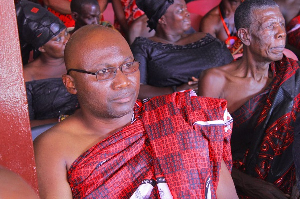- Home - News
- TWI News | TV
- Polls
- Year In Review
- News Archive
- Crime & Punishment
- Politics
- Regional
- Editorial
- Health
- Ghanaians Abroad
- Tabloid
- Africa
- Religion
- Election 2020
- Coronavirus
- News Videos | TV
- Photo Archives
- News Headlines
- Press Release
General News of Thursday, 26 June 1997
Source: --
Ministers Ready For Public Scrutiny At All Times - Gov't
Accra. June 19, - Ministers and public office holders in government are aware of their sacred and moral responsibility to uphold the principles of probity and accountability as enshrined in the National Democratic Congress (NDC) manifesto and for which many have laid down their lives. In this regard, they hold themselves in readiness to face public scrutiny at all times, according to an official release issued today by the Ministry of Communication in Accra. The release is in reaction to statements by the opposition and some concerned groups on the procedure for parliamentary approval for continuing ministers. It said the statements and publications have sought to create the unfortunate impression that the position of government, Parliament and the Supreme Court on the matter is at variance with the NDC's avowed principle of probity and accountability.
"It is gratifying to note, however, that even those who continue to condemn the revolutionary upheavals of May 15, June four, and December 31 are nonetheless convinced that probity and accountability in the Ghanaian political fabric are the direct products of these events." The release said it is unfortunate that a few persons and groups seem to regard the exercise to scrutinize office holders as an opportunity to scandalize and destroy the reputation of office holders and settle political scores under the guise of parliamentary privilege or the right of the public to know. It said while the current debate on the procedure for approving retained ministers is healthy, a few pertinent observations should be made. The government said it wishes to place on record the fact that all continuing or retained ministers have gone through a Parliamentary vetting process. "Despite the fact that the NDC had an overwhelming presence in the last Parliament, it is on record that ministerial and other nominees were subjected to a thorough scrutiny, sometimes to the point of controversy." The release said it is unfortunate that the opposition, by their own decision to boycott the 1992 parliamentary elections, denied themselves the opportunity of participating in the vetting of nominees at that time.
"It would appear that, but for their decision to boycott Parliament in 1993, the opposition would not have found it necessary to argue that continuing ministers should go through another public hearing. "Thus the present stand of the opposition seems to suggest that they want others to pay the price for their ill-advised refusal to be in Parliament in 1993-95." The statement said it must be emphasized that the principles of probity and accountability go beyond vetting. "There are ample means provided in the constitution for dealing with ministers who abuse their office. Parliament can pass a vote on censure and recommend the removal of such a minister to the President. "Alternatively, a report can be made to the CHRAJ which is empowered to probe the conduct or financial affairs of any public official including ministers against whom allegations of impropriety are made. "It is important to note here that persons with information on any acts of impropriety against any minister need not wait for four years when ministers have to be approved by parliament before they come up with information." The government said the real issue at stake is an interpretation as to what is required to be done under the law in respect of retained or continuing ministers considering that there is no precedent on the subject in the country.
Since there were varying interpretations on the subject, the Minority Leader, Mr J.H. Mensah, sought an interpretation on the relevant provisions of the constitution at the Supreme Court. The release said in its ruling the Supreme Court stated that the tenure of ministers was linked with that of the President. It also ruled that continuing ministers require prior approval from Parliament. However, it did not agree with the view expressed by the opposition that a necessary incidence of prior approval is a public hearing or vetting. "This is what the Supreme Court meant when it decided by a 4-1 majority that prior approval is not a term of art. The court, therefore, appeared to have left the issue of what constitutes the process leading to prior approval to parliament to decide." The release said it is up to Parliament to develop a convention as to how to treat the case of continuing or retained ministers. "This Parliament did by passing a resolution to the effect that such ministers need not go through another process of public hearing, having been subjected to the same process by Parliament." The government expressed the hope that Parliament would also extend the convention to cover members of the judiciary who are already serving on the Bench because in their case too, another approval is not considered necessary. "It must be noted that the Parliamentary convention relating to the procedure for prior approval of retained ministers does not (rpt not) deny Members of Parliament, more so the minority parties, the right to make comments on the nominees on the floor of the House."










